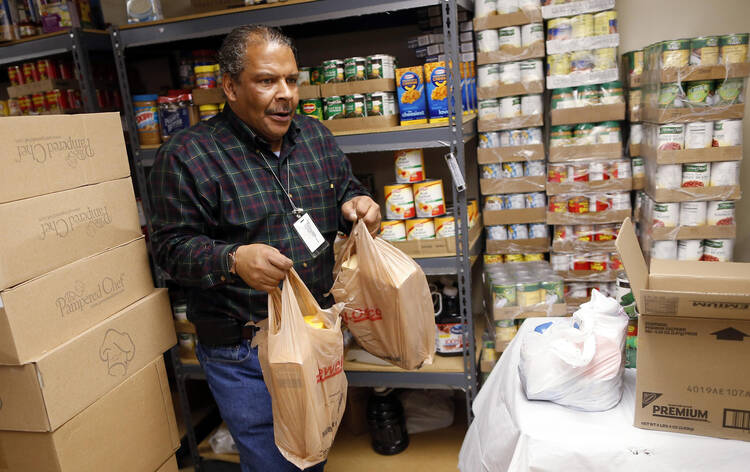It’s easy to despair over the political media’s obsession with scandal and election strategy, but Pope Francis’ statements on economic inequality — paired with the news hook of the 50th anniversary of Lyndon Johnson’s War on Poverty — haven’t gone unnoticed in Washington. At America’s In All Things blog, Kevin Clarke notes that “the capacity of the market to respond adequately to the needs of the poor” has become an issue in the 2014 congressional campaign, thanks in part to the “Francis effect.”
Clarke quotes the New York Times’s Sheryl Gay Stolberg on one manifestation of the Francis effect: “Republicans find themselves forced to justify votes to cut food stamps and unemployment benefits even as they try to counter the perception that they are indifferent to the poor.” Still, it’s only January, and there’s no guarantee that reporters will be asking about poverty in November. The GOP is not going to let poverty become the focal point of the election season. (The Washington Examiner’s David M. Drucker points to their preferred issue: “Republican campaign strategists view the troubled Obamacare as unqualified electoral gold.”) And it’s not a sure thing that the Democrats are going to want to touch it either.
As The New Yorker’s Jeff Sosel writes, “poverty” is not a word that pays dividends in American politics. According to his research, the word has virtually disappeared from State of the Union addresses since Johnson hammered at it, and public opinion polls explain why:
Even the poor don’t want to hear about the poor: most (studies say) see themselves as “middle class.” Hence the replacement, by Presidents of both parties, of freighted words like “the poor” with sad-eyed clichés: “people who are struggling,” and “folks” who are “down on their luck” and “bump into some hard times.” In this way, national policy becomes a kind of large-scale human-interest story.Thus President Obama’s emphasis on “piecemeal reforms,” like raising the minimum wage, and the eyes averted from what Sosel calls “the chronically and ruinously poor, the sort of people who in other countries get called the ‘underclass.’”
Tiptoeing around poverty is intuitive for Democrats, who largely accept the idea that their party must hug the center in order to win elections (or they must “triangulate,” as Bill Clinton supposedly did with much success in the ’90s). There is an empirical case to be made for this belief: The Democrats have won the popular vote in five of the past six presidential elections largely by erasing the Republican advantage in genuinely middle-class suburbs in key Northern states. But the Democratic Party’s recent priority on reducing federal deficits, as opposed to maintaining a safety net, could also turn off potential voters.
The Economist’s Lexington blog warns that a sudden, election-year “Robin Hood” approach to inequality (consisting of popular but arguably weak-tea ideas like the extension of unemployment benefits and minimum-wage hike) may not give the Democrats an advantage this fall. One reason is that the party has such shaky support among low-income voters:
A new study of election data from 1972 to 2008 by two political scientists, Jan Leighley of American University and Jonathan Nagler of New York University, unearthed two striking findings about Americans and redistribution. First, those who turn out to vote are consistently more hostile to redistribution than those who do not — largely because voters earn more and are better educated, on average, than non-voters. Second, the same low-income Americans who favour government safety-nets and interventions often fail to vote because they see no real differences between the parties.
A shared fear of uttering the word “poverty” may have something to do with the perception that there’s “no real differences between the parties.”
Changing the subject to education
The Democratic Party’s tentativeness toward addressing inequality gives conservatives a chance to set the agenda. The Washington Post's Lydia DePillis reported last week on an annual gathering of the U.S. Chamber of Commerce, at which “redistributive programs” were rejected as a solution to rising income inequality. The Chamber’s alternative: a better educational system. DePillis relays the response of Chamber President Tom Donahue when asked what should be done about inequality:
“We paint our K-12 schools with the same brush. There are a lot of K-12 schools where our kids get great educations. The real question is, what are we going to do with that 30 percent, whatever the number, 40 percent that are disadvantaged?” he started out. "They lack equality of opportunity, because of those schools.”
Educational reform is likely to poll better than a War on Poverty among high-voter-turnout, middle-class suburbanites. It’s also in the Chamber of Commerce’s interest to create a surplus of well-educated, highly skilled workers.
U.S. Rep. Paul Ryan, a possible contender for the GOP nomination in 2016, has been talking about poverty, and he also focuses on greater economic opportunity rather than direct assistance. In an interview with the Christian Broadcast Network (relayed by ThinkProgress’s Travis Waldron), Ryan said:
The preferential option for the poor, which is one of the primary tenants of Catholic social teaching, means don’t keep people poor, don’t make people dependent on government so that they stay stuck at their station in life, help people get out of poverty out onto life of independence.
Encouraging “independence” for more Americans is a worthy goal, but it’s not a cure-all for poverty. There are always going to be people who can’t get jobs, and there are always going to be low-skill jobs that don’t necessarily elevate people above the poverty line. It’s not enough to slightly increase the opportunities for upward mobility in the United States, especially if we write off everyone who doesn’t succeed in taking advantage of them. This fall, we’ll see whether the “Francis effect” is powerful enough to keep candidates (and voters) from falling back into indifference toward the least fortunate.
Photo of food pantry handler Kenneth Willis, at the Emergency Assistance Department at Chicago Catholic Charities, from Catholic News Service.








